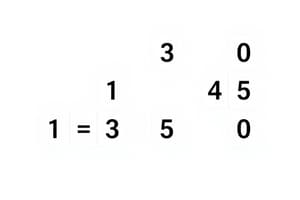Podcast
Questions and Answers
What type of data structure is a queue?
What type of data structure is a queue?
- Random access
- Unordered
- Last-in, first-out (LIFO)
- First-in, first-out (FIFO) (correct)
What is a common application of queues?
What is a common application of queues?
- Sorting algorithms
- Job scheduler operations in an Operating System (correct)
- Data encryption
- Image processing
In a queue, where are elements added and removed?
In a queue, where are elements added and removed?
- Added and removed from the same end
- Added at rear, removed from front (correct)
- Added and removed randomly
- Added at front, removed from rear
What kind of data structure is a tree?
What kind of data structure is a tree?
In a tree, what is the root node?
In a tree, what is the root node?
Which algorithm is commonly used for sorting in priority queues?
Which algorithm is commonly used for sorting in priority queues?
What is the main characteristic of a stack data structure?
What is the main characteristic of a stack data structure?
Which data structure is specifically used as a temporary storage structure for recursive operations?
Which data structure is specifically used as a temporary storage structure for recursive operations?
What application involves checking the syntax of expressions in a programming environment?
What application involves checking the syntax of expressions in a programming environment?
In a stack, what must be deleted first based on the Last-In, First-Out principle?
In a stack, what must be deleted first based on the Last-In, First-Out principle?
Which data structure is used for the playing sequence of multiple players in a game?
Which data structure is used for the playing sequence of multiple players in a game?
What is a key characteristic of stacks when implementing function calls?
What is a key characteristic of stacks when implementing function calls?
What is the main characteristic of Quicksort?
What is the main characteristic of Quicksort?
What does Divide and Conquer aim to achieve in problem-solving?
What does Divide and Conquer aim to achieve in problem-solving?
What advantage does Quicksort have over other sorting algorithms?
What advantage does Quicksort have over other sorting algorithms?
Which sorting algorithm works by recursively dividing an array into sub-arrays and then merging them back together?
Which sorting algorithm works by recursively dividing an array into sub-arrays and then merging them back together?
What is a disadvantage of Divide and Conquer approaches in algorithms?
What is a disadvantage of Divide and Conquer approaches in algorithms?
Which sorting algorithm selects a pivot value and compares array elements against it to create sub-arrays?
Which sorting algorithm selects a pivot value and compares array elements against it to create sub-arrays?
Flashcards are hidden until you start studying
Study Notes
Sorting Algorithms
- Quicksort is the most efficient sorting algorithm, also known as partition-exchange sort, which starts by selecting a pivot value from an array and dividing the rest of the array elements into two sub-arrays.
- It compares each element with the pivot value and recursively sorts the arrays.
Divide and Conquer
- Divide and Conquer is a problem-solving approach that breaks down a complex problem into smaller sub-problems, solves each sub-problem, and then combines the solutions.
- It efficiently uses cache memory without occupying much space, making it faster than other algorithms.
- However, it requires high memory management and can lead to explicit stack overflow.
Queues
- A queue is a First-In-First-Out (FIFO) data structure in which elements are added at one end (rear) and removed from the other end (front).
- Queues can be implemented using arrays or linked lists.
- Applications of queues include:
- Job scheduling operations in OS
- CPU scheduling
- Disk scheduling
- Priority queues in file downloading
- Data transfer between peripheral devices and CPU
- Interrupts generated by user applications for CPU
- Calls handled by customers in BPO
Trees
- A tree is a non-linear data structure that organizes data in branches, imposing a hierarchical structure on the data elements.
- Trees can be used to implement:
- Doubly linked lists for forward and backward navigation in a browser
- Circular queues to maintain the playing sequence of multiple players in a game
Stacks
- A stack is a linear data structure in which insertion and deletion of elements are done at only one end, known as the top of the stack.
- Stacks follow the Last-In-First-Out (LIFO) pattern.
- Applications of stacks include:
- Temporary storage for recursive operations
- Auxiliary storage for nested operations, function calls, and deferred/postponed functions
- Evaluating arithmetic expressions in programming languages
- Converting infix expressions into postfix expressions
- Checking syntax of expressions in a programming environment
- Matching parentheses
- String reversal
- Solutions based on backtracking
Studying That Suits You
Use AI to generate personalized quizzes and flashcards to suit your learning preferences.





